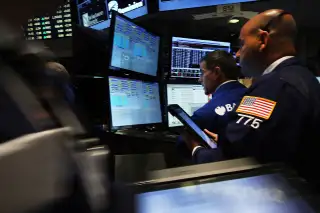Why You Shouldn't Trade Stocks First Thing In The Morning

The first thirty minutes after the stock market opens is a popular time to trade. For the past five full years, the period between 9:30 a.m. and 10 a.m. has steadily accounted for 13% of daily trade volume, with the first 10 minutes of the day accounting for 5%. But especially given the current market's increasing volatility, first thing in the morning may actually be the worst time to trade stocks.
The Wall Street Journal reported Tuesday morning that the gap between the price sellers ask for a stock and the price buyers are willing to pay is greatest at the beginning of the day, before experiencing a "morning jolt" just prior to 10 a.m. that shrinks it significantly. This large gap lowers one's chances of getting the best price and makes investors more susceptible to big market swings. And while the difference may only amount to "pennies a share," the authors write, it's still significant enough to add up: for the S&P 500, the average size of the morning gap over the first half of 2015 was 0.84 percentage point at the market's opening, 0.08 percentage point 15 minutes later, and less than 0.03 percentage point at the market's close hours later.
The takeaway? Wait until the day gets under way before trading stocks—especially in today's market.
As an investment associate with the financial advisory firm Truepoint Wealth Counsel LLC, Chris Vorwald, told the WSJ: “In the morning, you tend to get a lot of overreaction to overnight news or news coming out of other markets...When you have a day where the market is falling hundreds of points, let the market settle down and get a better idea of where the true market is before you trade."
Read Next:
What's At Stake When the Fed Votes on Interest Rates